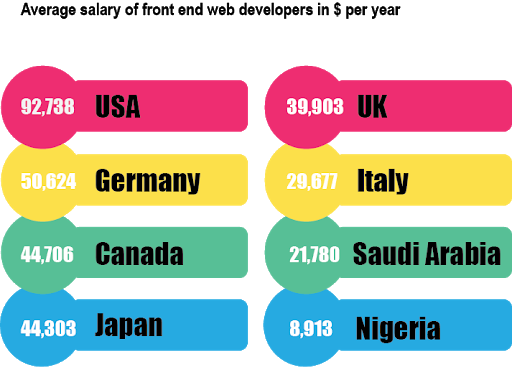Front-end developers work with the client-side programming of websites. They are naturally in high demand.
The salary of a front-end developer in a company like Apple, Facebook, or Google can be as high as US$400,000 annually. Even the package offered by startups is fairly high in the US.
The following graph gives an idea of the average annual cost of hiring front-end developers in US$. The data is of October 2018 from 8 different countries spread across the globe:

Why Front-end Development Is Complex
Experts in web development believe that front-end developers have a tougher job than their back-end counterparts. The reasons are as follows:
- Front-end development work is constantly in flux because of the advances that keep happening.
- The front-end code has to be compatible with different versions of a varying range of browsers. Each version of every browser operates with its own limitations and bugs. The front-end developer has to take all of those into account.
- Making the front-end compatible with mobiles is even tougher because of the incredible variation of smartphones. Some Android versions not only have bugs but feature regressions also.
- Front-end developers have to work with CSS and HTML, both of which have limitations with reference to dealing with bugs.
- Front-end developers need to understand website behavior and security issues, both of which keep changing.
- Front-end developers need to have an eye for design, and the empathy to develop everything from the users’ perspective.
Front-end Web Developer Skills To Look For:
Front-end developers need to have three sets of skills: primary tech capacity, secondary abilities related to design and web performance, and soft skills:
Primary Skills (Technical)
- HTML (Hypertext Markup Language): HTML constitutes the nuts and bolts of any website content. This is the most basic skill that every front-end developer you hire must have at their fingertips.
- CSS (Cascading Style Sheets): This is the language to determine how to present the content on the foundation built with HTML. CSS determines the style of the website – its animations, color, fonts, layout, etc.
- Javascript/Jquery: This is what makes websites interactive. Javascript (JS) is the programming language that determines how a website functions. Jquery is a library of addons and plugins that compress some common functions requiring multiple JS scripts into a single line.
- CSS and Javascript Frameworks: These frameworks contain an assortment of CSS and JS files that provide a common framework for a number of tasks. The option of using both of them together extends the range of multifunctionality.
The CSS Bootstrap, for example, handles the look and feel of a website while Angularjs determines the content.
Frameworks have their pros and cons like everything else. If you hire a front-end developer, he needs to know which frameworks to use for what kind of website.
In-depth knowledge of CSS and JS frameworks is also essential for the efficient responsiveness of websites. - Command Line: Graphic User Interfaces (GUIs) are essential as they facilitate pointing and clicking on an interactive menu. However, sometimes it becomes necessary to key in commands for something specific. Front-end developers need to have this command line skill in addition to their mastery over GUIs.
- RESTful Services/APIs: Representational State Transfer (REST) is a computer technology with a high level of usage. It enables two computer systems to communicate with each other over HTTP.
Lower bandwidth usage determines the preference for REST over SOAP (Simple Object Access Protocol).
RESTful APIs (Application Program Interfaces) allow front-end developers to code their interfaces without depending on the back-end. RESTful APIs use HTTP requests to GET, DELETE, POST, and PUT data.
Secondary Skills (Design and Web Performance Related)
- UI/UX Design: The ultimate test of a website is in its efficiency in user interface (UI) and user experience (UX). A front-end developer has to ensure that the website performs well on different browsers. This is where automation tools come into the picture.
Efficient UX designing needs control over information architecture. An efficient copywriter may supply the content, but the hired front-end developer has to determine the order in which users get to see that content. - Visual Editing: Visual communication is an essential front-end web developer skill. It covers the entire span from determining the visual hierarchy to making elements appear clickable.
- GIT/Version Control: Version control software like the most-preferred GIT allows the front-end developer to return to the previous version to check what might have gone wrong when something does.
- Wireframing: This is the structural blueprint of a webpage. It outlines the content and functionality of the page with a focus on user needs and experiences. Combined with UI prototyping, wireframing facilitates the identification of mistakes before the designing process starts.
- Debugging: Bugs are an inevitable feature of the front-end development process. It is essential for front-end developers to keep testing their code for bugs and debug it.
Also Read: 10 FAQs To Consider When Outsourcing Front-end Development
Soft Skills
A scan of job postings for hiring front-end developers across the globe reveals an interesting feature.
A number of companies, the tech giants included, ask for some human skills before they go into technical skills. The reason is, without these basic human skills, even a tech genius will be unable to work effectively in a collective workspace.
More importantly, the front-end developer needs to keep the user in mind. That, too, is impossible with just tech skills. It needs the human skills listed below:
- Teamwork: Your front-end developer needs to work in a team environment like everyone else. A loner will never have empathy for the user.
- Communication: One without effective communication skills is unlikely to fully understand how best to communicate with users.
- Problem Solving: Knowing how to work around a problem is what differentiates a good front-end developer from an average one.
- Creativity: Without a creative flair, your front-end developer will not know what looks good enough to hold your visitor and convert them.
- Attention to Detail: On the client interface side, every little thing matters just as much as the big picture.
What Next?
Front-end development is a field of constant evolution. You need people willing to constantly learn and adapt. Outsource your front-end development work to a dedicated team at Uplers.
You’ll have a team with the entire range of skill-sets mentioned here. A team that is capable of learning on the job and adapt.















